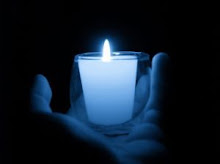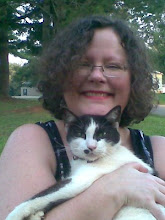 I recently received an email from a friend regarding her identity has a bisexual woman. While she is married to a woman, she feels offended when she is identified as a lesbian. My friend questions if the morality of her Christian upbringing taints the label of lesbian, or if there is something else that bothers her. Before I answer her, however, I thought I would work out some of my thoughts here.
I recently received an email from a friend regarding her identity has a bisexual woman. While she is married to a woman, she feels offended when she is identified as a lesbian. My friend questions if the morality of her Christian upbringing taints the label of lesbian, or if there is something else that bothers her. Before I answer her, however, I thought I would work out some of my thoughts here.For forty years I identified as a heterosexual woman. I have been married four times, divorced three times and widowed once. I have two adult sons. While there had been a few women in my life along the way, I had mostly relegated those relationships to my "wilder" days. As a now post-menopausal woman, now I recognize how profoundly hormones, church and societal expectations dictated my self identification.
 My first clue of at least being bisexual came when I was seventeen. My neighbor was twenty-five, and her husband close to forty. We got involved in a threesome, but my focus was much more on her than her husband. Ten years later in graduate school, although I was married, I had a two year long relationship with a lesbian. Still later there was a brief affair with a much younger woman who wasn't really ready for a relationship with me and my complications.
My first clue of at least being bisexual came when I was seventeen. My neighbor was twenty-five, and her husband close to forty. We got involved in a threesome, but my focus was much more on her than her husband. Ten years later in graduate school, although I was married, I had a two year long relationship with a lesbian. Still later there was a brief affair with a much younger woman who wasn't really ready for a relationship with me and my complications.As the years accumulated and the damage worsened, I chose inappropriate men. By the end, I had a string of sociopaths that would make your skin crawl. It was a dark time, and I was blessed by the Lady to have survived. At forty I embarked upon a brief affair with a woman I love deeply, now as my sister-of-the-heart. In traditional lesbian fashion, my ex-lover is also my best friend.
For years I was resistant to identifying as lesbian. I have two sons that I love deeply. I have been married to men that I loved. I felt that if I identified as lesbian, I disavowed those relationships. I no longer believe that; now I believe that identities are fluid, shifting with the place we find ourselves. I was heterosexual. I was bisexual. I am lesbian.
Cameron and I began our relationship six years ago. The word bisexual is a difficult one for her, as her former lover identified as bisexual, and then proved to prefer men. The pain and anxiety of those years has left her very sensitized. Certainly the lesbian community treats women who identify as bisexual with great suspicion. The accusation of greediness, though wrong, is not uncommon.
For myself, I decided that if I am in a committed relationship with a woman, then I am going to identify as lesbian. I think I secretly like the rebelliousness of it, as well. Our society still disproves of homosexuality, and if I am bisexual, then our society will assume I haven't met the right man yet. If I am lesbian, I can be a card-carrying rainbow flag kind of girl. Yet I don't think my blatant homosexuality is as difficult of a space to occupy as being bisexual. It seems to me that no matter who your partner is, you would have to always defend that other aspect of self in order to be true to your identity.
 Most importantly for me, I don't believe I could ever engage in an intimate relationship with another man. If, Goddess forbid, Cameron should cross in to the summerlands before me, I cannot see myself involved with a man. I don't find myself watching them, or feeling a pull of attraction or desire. I do find myself watching women, attracted to them, desiring them. So it makes since to me that the drive of hormones has subsided, and this place in my life is exclusively lesbian.
Most importantly for me, I don't believe I could ever engage in an intimate relationship with another man. If, Goddess forbid, Cameron should cross in to the summerlands before me, I cannot see myself involved with a man. I don't find myself watching them, or feeling a pull of attraction or desire. I do find myself watching women, attracted to them, desiring them. So it makes since to me that the drive of hormones has subsided, and this place in my life is exclusively lesbian.I wonder if my friend resists identifying as lesbian because it would require her to disavow an important part of herself. Perhaps she has had significant heterosexual relationships and she doesn't want to be accused of not letting them work out well because she was really gay. Perhaps our society's attitudes make her resistant to limiting herself, regardless of the commitment to her current relationship. Perhaps the echoes of our Christian churches cause her to be resistant of the lesbian label.
Ultimately, I think it comes down to a difference between identity and labels. How we identify is self determined. I am a lesbian whether I am with a partner or not. Labels, on the other hand, tend to be applied by other's perceptions of us. So perhaps my friend objects to the labels others apply to her, even though she is married to a woman, because the label limits her identity.










Interesting thoughts. The questions strike a spark in me. I'm fairly comfortable with my identity as a heterosexual, but I'm not all that firm on my image as a woman. This post stirs some of those questions for me. Thank you for sharing.
ReplyDeleteGood points. I think its all about loving a PERSON. But I do identify myself as strongly hetero. I just know I am only attracted to men and nothing but. And all of us are different, that's just me.
ReplyDeleteHibiscus Moon,
ReplyDeleteI think the concept of loving a PERSON is what brought me through so much of self-examination. Loving Cameron means loving her no matter where she is, in her male or female aspects. Since she is genderbending/blending, a gender identity disordered person, who does not currently seek a surgical solution, I have had to think that loving the person concept through throughly. For those friends whose relationships survive transitioning, that is a profound element of their focus, though not the only one.
I think my friend's stuggle comes from the labels others impose upon her, thereby an attempt to know her identity but not hearing what she has to say about it. It's sad that we live in a world where we assume knowledge without consulting the other person about their interal landscape.
Java,
ReplyDeleteI always wonder if our innate strengths as women put us at such odds of our society's definition of woman, that we inevitably become at odds with being a woman. Sometimes I think we need to teach our little girls about warrior women from the cradle. Show them the strength and wisdom of Ceridwen, reclaim the power of the Medusa, honor the stregth of Innana's descent. If we taught our children to see the power of being a woman, instead of the power of men to dominate women, perhaps some of the quandries of gender would not exist.